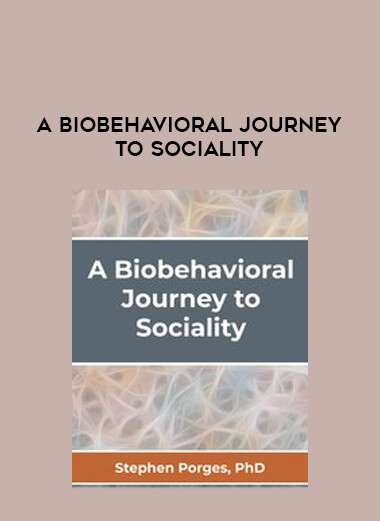A Biobehavioral Journey to Sociality
 Salepage : A Biobehavioral Journey to Sociality
Salepage : A Biobehavioral Journey to Sociality
Arichive : A Biobehavioral Journey to Sociality
Faculty:
Stephen Porges, PhD
Duration:
37 Minutes
Format:
Audio and Video
Copyright:
Nov 05, 2021
Product Code:
POS058705
Media Type:
Digital Seminar
Polyvagal Theory emphasizes sociality as the core process in mitigating threat reactions and supporting mental and physical health. The theory clarifies the neurobiological and biobehavioral shifts that occurred during the evolutionary transition from asocial reptiles to social mammals. This transition repurposed the autonomic nervous system with capacities to self-calm, to spontaneously socially engage others, and to mitigate threat reactions in ourselves and others through social cues. Through the lens of the theory, disruptions in behavioral regulation, learning skills, language development, and mental and physical health issues are often related to a disruption of the core neurobiological process underlying sociality.
Stephen W. Porges, Ph.D., is a Distinguished University Scientist at Indiana University where he is founding director of the Traumatic Stress Research Consortium. He is Professor of Psychiatry at the University of North Carolina, and Professor Emeritus at both the University of Illinois at Chicago and the University of Maryland. He served as president of the Society for Psychophysiological Research and the Federation of Associations in Behavioral & Brain Sciences and is a former recipient of a National Institute of Mental Health Research Scientist Development Award. He has published more than 300 peer-reviewed papers across several disciplines including anesthesiology, biomedical engineering, critical care medicine, ergonomics, exercise physiology, gerontology, neurology, neuroscience, obstetrics, pediatrics, psychiatry, psychology, psychometrics, space medicine, and substance abuse. In 1994, he proposed the Polyvagal Theory, a theory that links the evolution of the mammalian autonomic nervous system to social behavior and emphasizes the importance of physiological state in the expression of behavioral problems and psychiatric disorders. The theory is leading to innovative treatments based on insights into the mechanisms mediating symptoms observed in several behavioral, psychiatric and physical disorders. He is the author of The Polyvagal Theory: Neurophysiological foundations of Emotions, Attachment, Communication, and Self-Regulation (Norton, 2011), The Pocket Guide to the Polyvagal Theory: The Transformative Power of Feeling Safe (Norton, 2017), and co-editor of Clinical Applications of the Polyvagal Theory: The Emergence of Polyvagal-Informed Therapies (Norton, 2018). He is the creator of a music-based intervention, the Safe and Sound Protocol™, which currently is used by more than 1400 therapists to improve spontaneous social engagement, to reduce hearing sensitivities, to improve language processing and state regulation.
Speaker Disclosure:
Financial: Dr. Stephen Porges has employment relationships with Indiana University Bloomington and the University of North Carolina. He is a published author and receives royalties. Dr. Porges receives a speaking honorarium, book royalties, and recording royalties from PESI, Inc. He is a scientific advisor to Integrated Learning Systems/Unyte and receives a royalty. All relevant financial relationships with ineligible organizations have been mitigated.
Non-financial: Dr. Stephen Porges is a member of the American Psychological Association, the Association for Psychological Science, and the Society for Psychophysiological Research.































Reviews
There are no reviews yet.